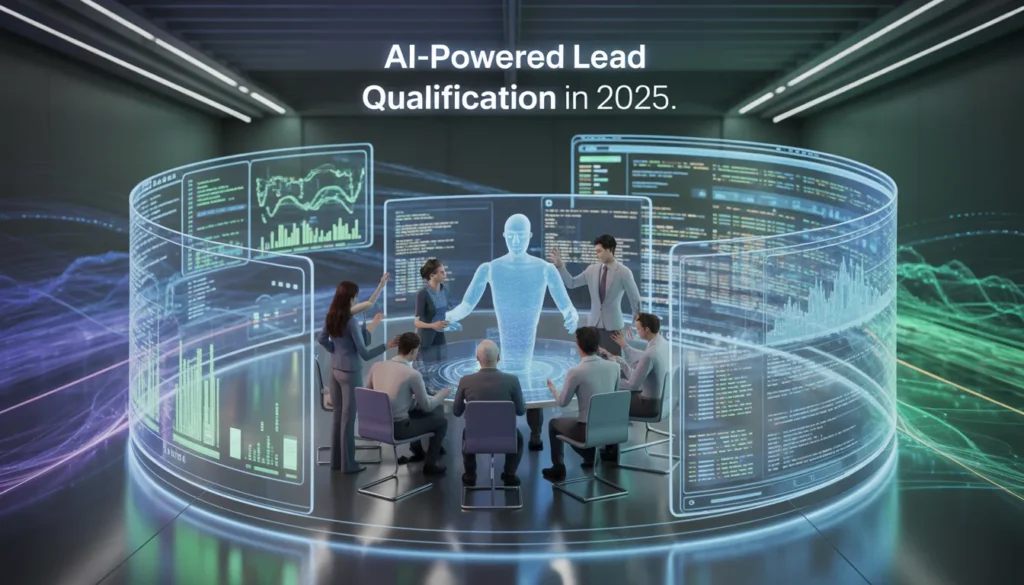
gusnatø
- May 26, 2025
- AI Summary
In an era defined by rapid technological advancements, businesses are increasingly relying on automation and artificial intelligence (AI) to enhance operational efficiency. Lead qualification, a critical component of the sales process, is experiencing a significant transformation due to the emergence of AI agents. These intelligent systems are streamlining processes, increasing accuracy, and enabling personalization, ultimately revolutionizing how organizations engage with potential customers. This article explores the key aspects of AI agents in lead qualification, examining their benefits, applications, and the future landscape in 2025.
AI Agents: what are they?
AI agents are autonomous systems designed to process data, make decisions, and perform tasks with minimal human intervention. Utilizing advanced algorithms, machine learning, and natural language processing (NLP), these agents can engage with leads in real-time, analyzing vast amounts of data to determine the quality and readiness of potential customers. This technology has shifted lead qualification from a manual, time-consuming process to an automated system capable of operating around the clock.
The sophistication of AI agents allows them to simulate human interactions and provide insights that drive decision-making. By leveraging vast datasets, they can deliver contextually relevant information, enhancing the likelihood of conversion from lead to customer.
The Evolution of Lead Qualification
Traditionally, lead generation and qualification involved sifting through data and assessing potential customers based on limited criteria. This outdated approach often led to missed opportunities and inefficient allocation of resources. In contrast, AI agents are equipped to analyze a multitude of factors, including engagement history, demographic information, and behavioral patterns.
By 2025, organizations leveraging AI for lead qualification are expected to see a marked improvement in their ability to identify high-quality leads swiftly. AI agents facilitate this by creating real-time profiles based on interactions and feedback, allowing for more precise evaluations of lead potential. The shift towards AI-driven methodologies is irreversible, leading to an era where data reigns supreme in guiding sales strategies.

Key Benefits of AI Agents in Lead Qualification
- Speed and Efficiency: AI agents can process and analyze data at an unprecedented speed. For instance, they can evaluate and respond to potential leads within seconds, significantly reducing the time spent on initial screening and allowing sales teams to focus on converting high-value prospects. This capability enables businesses to engage with leads promptly, maximizing the chances of conversion.
- Enhanced Accuracy: The use of AI reduces human error in the qualification process. These agents learn from every interaction, improving their predictive capabilities and accuracy over time. As a result, businesses can trust that their lead evaluations are based on comprehensive data analysis rather than subjective judgment.
- Personalization: AI agents excel in providing personalized experiences by analyzing customer behavior and preferences. By tailoring interactions and recommendations, they foster a stronger connection with leads. Personalization is critical in today’s market, where customers expect tailored solutions that meet their specific needs. Leveraging AI for targeted campaigns can lead to a significant increase in engagement rates, as leads feel valued and understood
- Automated Follow-ups: One of the significant advantages of AI agents is their ability to manage follow-ups automatically. They can schedule appointments, send reminders, and deliver personalized communications, ensuring that no lead is neglected. This continuous engagement keeps potential customers informed and nurtures relationships over time.
- Data-Driven Insights: AI agents generate valuable insights through data analysis capabilities. By identifying patterns and trends in customer interactions, they can inform sales strategies and decision-making processes. This data-driven approach allows businesses to allocate resources more effectively and optimize their sales funnels, leading to a higher return on investment Guide to AI Lead Generation in 2025 – Botpress.
Benefits of AI Agents in Lead Qualification
| Benefit | Description | Impact |
|---|---|---|
| Speed and Efficiency | AI agents analyze data quickly and respond in real-time. | Reduction in lead response time by up to 50% |
| Enhanced Accuracy | Continuous learning from interactions improves data evaluation. | Increased lead scoring accuracy by 30% |
| Personalization | Tailors interactions based on lead behavior and preferences. | Higher engagement rates (up to 40%) |
| Automated Follow-ups | Automated scheduling and reminders streamline the process. | Better lead nurturing and follow-up rates |
| Data-Driven Insights | Generates actionable insights for sales strategies. | Improved decision-making efficiency by 25% |
Applications of AI Agents in Lead Qualification
The applications of AI agents in lead qualification are vast and varied. Here are some notable examples:
- Automated Lead Scoring: AI agents can evaluate leads based on various factors, such as website interactions, email engagements, and social media activity. This scoring system prioritizes leads according to their likelihood to convert, enabling sales teams to focus their efforts where they matter most.
- Chatbots and Virtual Assistants: AI-powered chatbots can engage with website visitors, answer queries, and gather essential information about potential leads. This interaction not only qualifies leads but also provides an exceptional customer experience. By integrating chatbots across multiple platforms, businesses can ensure a consistent and seamless interaction environment.
- Predictive Analytics: Utilizing historical data, AI agents can forecast lead behavior and potential outcomes. This predictive nature allows businesses to identify which leads are most likely to engage, and prepare tailored strategies accordingly. Companies that implement predictive analytics in their sales strategies often see better alignment between their outreach efforts and customer expectations, resulting in improved conversion rates AI Agents in 2025: A Guide for Leaders – Artificial Intelligence.
- Integration with CRM Systems: AI agents can seamlessly integrate with existing Customer Relationship Management (CRM) systems, facilitating the flow of information. This integration ensures that sales teams have access to up-to-date lead data and can track interactions effortlessly, leading to more informed decision-making and strategic planning.
The Role of Human Insight
Despite the advantages of AI agents, human insight remains a critical component of successful lead qualification. While AI can handle data analysis and initial interactions, sales professionals bring contextual understanding and emotional intelligence to customer relationships. Combining automation with human expertise enables organizations to navigate complex scenarios and build deeper connections with leads.
In 2025, organizations that successfully integrate AI agents while retaining human oversight will likely outperform competitors that rely solely on one approach. The future of lead qualification lies in collaboration between technology and human intuition, balancing efficiency with a personalized touch.
Future Trends in AI-Driven Lead Qualification

The landscape of lead qualification is set to evolve further in 2025, with several trends on the horizon:
- Generative AI: The utilization of generative AI will enhance the conversational abilities of AI agents, enabling them to create more engaging and meaningful interactions. This technology could revolutionize how leads are nurtured, making engagements feel more personable and tailored AI Agents Take the Lead: A Look Ahead to 2025 – Medium.
- Increased Automation: The trend towards automation will continue, with AI agents taking on more complex tasks such as managing entire lead pipelines and executing sophisticated sales strategies. This will free up sales teams to focus on strategy and high-quality interactions rather than administrative tasks.
- Enhanced Data Security: As businesses move towards AI-driven approaches, data security will become a top priority. Organizations will need to implement robust security measures to protect customer data while leveraging AI insights. The ethical implications of AI usage in data processing will also lead to stricter regulatory scrutiny, pushing companies to prioritize privacy and compliance.
- Greater Customization: Future AI solutions will likely offer more customization options, allowing businesses to tailor their AI agents to specific industry needs and customer profiles. This adaptability will enhance the overall effectiveness of lead qualification systems across various sectors.
Comparison of Traditional vs. AI-Driven Lead Qualification
| Feature | Traditional Lead Qualification | AI-Driven Lead Qualification |
|---|---|---|
| Data Processing Speed | Slower (manual analysis) | Instantaneous (real-time) |
| Human Error Risk | High | Low |
| Personalization Level | Limited | High (data-driven insights) |
| Scalability | Limited by resources | Highly scalable |
| Engagement | Reactive | Proactive |
Frequently Asked
What are AI agents?
AI agents are autonomous software systems that leverage machine learning and natural language processing to perform tasks, make decisions, and interact with users in real-time, fundamentally changing how businesses qualify leads.
How do AI agents enhance lead qualification?
AI agents enhance lead qualification by automating data analysis, scoring leads based on interaction history, and personalizing communication, which enables businesses to prioritize high-quality leads and improve conversion rates.
Can AI agents fully replace human sales representatives?
While AI agents significantly enhance lead qualification processes, human insight remains essential, especially in building relationships and dealing with complex customer inquiries. The best approach is a hybrid model that combines AI efficiency with human emotional intelligence.
What are some examples of AI tools used in lead qualification?
Examples include chatbots for real-time engagement, predictive analytics tools that forecast lead behavior, and CRM integrations that help track interactions and lead statuses.
What does the future hold for AI in lead qualification?
The future includes increased automation, integration of generative AI for enhanced conversations, greater customization for specific industries, and a heightened focus on data security and ethical AI usage.
Conclusion: the lead qualification revolution!
AI agents are revolutionizing lead qualification in 2025, providing businesses with enhanced efficiency, accuracy, and personalization. By automating complex tasks and offering data-driven insights, these agents empower sales teams to focus on high-value interactions and close deals effectively. However, the integration of human insight remains essential to navigating the complexities of customer relationships. As technology continues to evolve, the collaboration between AI and human agents will define the future of lead qualification, paving the way for innovative sales strategies and improved customer engagement.







